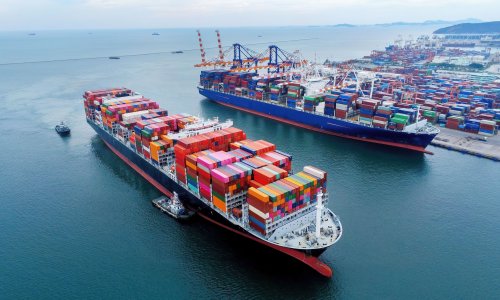Geopolitical tensions have always had significant ramifications on global economies, and India is no exception. In recent years, India has found itself navigating a complex web of international relations with key global powers, including the United States, China, and Russia. These tensions, ranging from trade disputes to military conflicts, have a direct impact on India’s trade flows, economic stability, and long-term growth trajectory. This article explores how ongoing geopolitical conflicts affect India’s economy, trade relations, and the strategies the nation is adopting to mitigate risks.

Understanding the Geopolitical Landscape
- India-China Border Tensions: The India-China relationship has been strained, particularly following the border skirmishes in regions such as Ladakh. Beyond security concerns, this rivalry has significant economic implications, as China is one of India’s largest trading partners.
- US-China Trade War: The trade war between the U.S. and China has created ripples in global trade dynamics. For India, this has been both an opportunity and a challenge. On one hand, some manufacturing has shifted from China to India, providing growth opportunities. On the other hand, increased global tariffs have disrupted India’s export markets.
- Russia-Ukraine Conflict: The ongoing conflict between Russia and Ukraine has had a widespread impact on global energy prices, supply chains, and trade balances. India, which relies on both Russian oil and Ukrainian agricultural imports, has felt the strain in rising costs and shortages.
- Middle Eastern Tensions: As a major energy-importing country, India is deeply affected by instability in the Middle East. Tensions in this region lead to volatile oil prices, impacting India’s import bills, inflation rates, and trade deficit.
Key Impacts of Geopolitical Tensions on the Indian Economy
- Supply Chain Disruptions The COVID-19 pandemic exposed India’s reliance on global supply chains, particularly for raw materials and intermediate goods. Geopolitical tensions further strain these chains, as seen in India’s dependency on China for critical inputs like electronics, pharmaceuticals, and chemicals. When relations deteriorate, the resulting trade restrictions or increased tariffs lead to costlier imports and delays, which in turn affect India’s manufacturing sector.
- Rising Commodity and Energy Prices Conflicts, such as the Russia-Ukraine war, create volatility in global energy and commodity prices. India, which imports around 85% of its oil, is highly vulnerable to oil price shocks. Rising prices increase inflationary pressures domestically, leading to higher costs for transportation, manufacturing, and overall living expenses. Similarly, agricultural imports like edible oils have seen price hikes, affecting the Indian consumer market.
- Inflation and Currency Fluctuations Increased import costs from geopolitical uncertainties lead to higher inflation. Furthermore, as investors seek safer assets during times of crisis, emerging markets, including India, experience outflows of foreign capital. This capital flight causes fluctuations in the Indian rupee, making imports more expensive and widening the current account deficit.
- Impact on Exports and Trade Balance Geopolitical tensions, especially with China, one of India’s major trading partners, can impact India’s export performance. India’s pharmaceutical and IT sectors, which rely on international clients, are also affected by diplomatic conflicts that disrupt trade agreements or market access. Similarly, sanctions or restrictions on certain goods can reduce export demand, which widens India’s trade deficit.
- FDI and Foreign Portfolio Investment (FPI) Impact Political stability and reliable international relations are critical for foreign investors. Geopolitical risks create uncertainty, often leading investors to either delay or withdraw their investments. Consequently, India may face reduced foreign direct investment (FDI) and foreign portfolio investment (FPI) inflows during periods of geopolitical instability, limiting capital availability for growth.
- Changes in Trade Agreements and Partnerships India’s diplomatic stance often requires strategic recalibrations in response to global conflicts. For example, India has joined the Quad alliance with the U.S., Japan, and Australia, primarily to counterbalance China’s influence in the region. Such alliances are reshaping India’s trade policies, leading to new agreements with like-minded countries while reducing reliance on China.

India’s Strategic Response to Mitigate Geopolitical Risks
India has taken several proactive steps to minimize its vulnerability to global tensions and foster economic resilience. Key strategies include:
- Strengthening Domestic Manufacturing with Atmanirbhar Bharat India’s self-reliance initiative, Atmanirbhar Bharat, aims to reduce dependency on imports, especially from countries like China. Through incentives under the Production Linked Incentive (PLI) scheme, India is bolstering local production in sectors such as electronics, pharmaceuticals, and automobiles. By strengthening domestic industries, India can reduce its reliance on volatile global supply chains.
- Diversifying Trade Partners To reduce over-reliance on any single country, India is actively exploring and expanding trade partnerships. Agreements with countries like Australia, Japan, and nations within the European Union have been prioritized. By diversifying trade routes, India can reduce the economic risks associated with any single trade partner’s conflict or trade restrictions.
- Securing Energy Supplies Given India’s dependence on energy imports, the government is focusing on long-term strategies to secure energy supplies. India is investing in renewable energy sources, aiming to become a global leader in solar and wind energy. Additionally, it is exploring alternative oil import options from countries in Africa and Latin America to reduce dependency on Middle Eastern oil.
- Promoting Export Competitiveness India has been working on increasing its competitiveness in high-demand export sectors such as IT, pharmaceuticals, textiles, and agricultural products. By enhancing the quality and appeal of these exports, India can maintain strong export revenues, even if relations with certain countries are strained. Initiatives like “Make in India” aim to promote India as a reliable manufacturing hub.
- Encouraging Strategic Investments and Alliances Recognizing the importance of strategic partnerships, India is focusing on alliances that align with its long-term economic and security interests. For instance, the Quad and BRICS alliances are significant diplomatic and trade platforms for India. These alliances help mitigate risks associated with global tensions and open up new economic opportunities for Indian businesses.
The Road Ahead: Building Resilience Amidst Global Uncertainty
While India cannot completely insulate itself from global geopolitical tensions, it can certainly strengthen its economic resilience through strategic planning and policy measures. Geopolitical risks are expected to remain a constant, and India must continue to adopt a flexible and pragmatic approach to navigating these challenges. Building resilience, securing supply chains, and reducing dependency on volatile sources are essential steps toward achieving sustainable growth.
The Indian government’s continued push for domestic production and diversification in trade can help mitigate economic disruptions. Furthermore, by pursuing renewable energy and forming alliances with like-minded nations, India is positioning itself to withstand external shocks more effectively.

Conclusion: Navigating a Challenging Geopolitical Climate
India’s economic growth and trade potential remain promising, despite the challenges posed by geopolitical tensions. Through a balanced combination of self-reliance, diversification, and strategic alliances, India is building a robust economy capable of withstanding global uncertainties. As global tensions continue to evolve, India’s proactive approach to mitigating risks and fostering resilience will be essential in safeguarding its economic interests and achieving long-term growth.
In this rapidly changing global landscape, India’s ability to adapt and innovate will determine its success. While geopolitical tensions may pose obstacles, they also offer opportunities for India to emerge as a more resilient and self-sufficient economy on the world stage.

